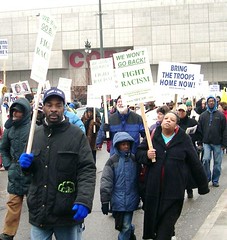
Martin Luther King Day demonstration in downtown Detroit where more than a thousand people called for the end to the Iraq war, racism and poverty. (Photo: Cheryl LaBash, WW)
Originally uploaded by Pan-African News Wire File Photos
16:55 Mecca time, 13:55 GMT
Dozens killed in Iraq suicide blast
Several journalists were among those injured in the Abu Ghraib blast
At least 33 people have been killed in a suicide bomb attack at a marketplace west of the Iraqi capital Baghdad, officials have said.
Tuesday's blast appeared to target a group of tribal leaders and security officials who were touring the crowded market in Abu Ghraib as part of an effort towards national reconciliation.
One police source said that the dignitaries were leaving a reconciliation meeting at Abu Ghraib's municipal headquarters when the blast occured.
"Casualties rose to 33 dead and the victims were civilians, including tribal leaders, as well as soldiers," an interior ministry official said.
Brigadier-General Qassim Atta, a spokesman for Baghdad army command operations, said: "The suicide bomber targeted a tour of the tribal leaders under the command of Major-General Mared Abdel Hassen [the head of tribal affairs in the interior ministry] and other officers in the market near the town hall."
The Cairo-based Baghdadiya TV said that one of its correspondents and a cameraman who had been covering the reconciliation meeting were killed in the blast.
Three other journalists were injured in the attack.
First Lieutenant Ahmed Mahmoud, a police official in Abu Ghraib said that at least 29 people, including schoolchildren, had been wounded in the blast.
Hostile factions
While violence has dropped sharply in Iraq, anti-government fighters continue to stage regular attacks.
The Abu Ghraib bombing came two days after 28 people were killed and 56 injured in a suicide attack outside a Baghdad police academy.
While there has an overall drop in the level of violence across Iraq in recent months, Iraqi soldiers and police officers are often targeted by opposition fighters.
Reconciliation among rival political factions is proving even more difficult than combating fighters.
Many factions remain hostile after six years of sectarian killings between Iraq's Sunni Arab minority, dominant under Saddam Hussein, the former president ousted by the US, and the country's Shia majority.
The US is set to begin reducing its troop levels in Iraq, currently standing at about 140,000, before a full withdrawal by the end of 2011.
Source: Agencies
No comments:
Post a Comment